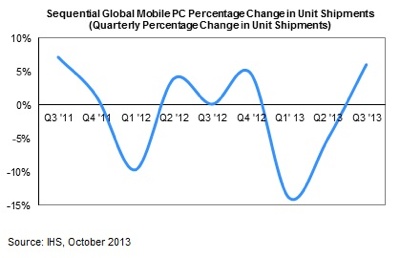How far have expectations fallen for the mobile personal computer (PC) business this year?
So far that single-digit sequential growth in the third quarter comes as the best news the notebook market has heard in many months — even as shipments plunged on a year-over-year basis. The year-over-year decline is making it increasingly apparent that the mobile PC market is headed for a second consecutive year of contraction in 2013, according to a new PC Dynamics brief from IHS Inc. (www.isuppli.com).
Mobile PC shipments worldwide are estimated to have reached 47.9 million units in the third quarter, up 6% from the second quarter. This represents the largest sequential growth since two years ago when the market rose 7% in the third quarter of 2011, as presented in the graph.
On the other hand, the third-quarter results show the market has now shrunk for five consecutive quarters on a year-over-year basis, starting from the second quarter of 2012 more than one year ago. This fifth quarter of decline, down 9% compared to the same time last year, is the second-worst drop after the sharp 14% loss incurred during the previous quarter.
"Amid the onslaught of tablets, the notebook PC market now is desperately seeking any reason for optimism — and the sequential growth in the third quarter is offering a ray of hope," says Craig Stice, senior principal analyst, compute platforms for IHS. "However, even with a respite from the sequential decline and a few other hopeful developments, the mobile PC business is still on track to decline for the full year of 2013. This means the notebook market will contract for the second consecutive year, a proposition that once would have been unthinkable for the formerly high-flying mobile PC business."
While mobile PCs continue to be engaged in a losing battle against tablets, several market developments appear encouraging.
For instance, Intel’s new Haswell microprocessor as well as its soon-to-be-released Bay Trail chip will make mobile PCs like Ultrabooks faster and more agile while also extending battery life — qualities that could enhance the machines’ appeal to consumers. Even Intel rival Advanced Micro Devices has a new lineup of processors —already released — that will compete not only in the performance sector but also in the low-power and entry-level-pricing markets, providing further indication that the mobile PC space still has players actively invested in the future of the market.
An indirect boost could come by way of the desktop PC space, which is expected to liven up as the Microsoft Windows XP operating system expires in April next year and the commercial segment then undergoes an anticipated refresh cycle. Such a development could potentially translate into millions of computers upgrading to a fresh operating system as well as more advanced hardware. Any uptick in the desktop space is potentially beneficial to the mobile market, especially if excitement over new software and hardware spills over and engages consumers.
"All hopes are now pinned on the fourth quarter, which could end up as one of the most important holiday seasons yet for the PC industry," Stice says. "With various new technologies launching, the PC trade believes it is playing its best hand in years. Many eyes will be watching to see how the rest of the year — to say nothing of 2014 — turns out."
The year, however, remains set to end on a disappointing note for the overall PC market, including mobile computers. Although the second half of 2013 will prove stronger than the first six months of the year, the deep damage inflicted during the first half will make its presence felt when final results are tallied by year-end. As a result, the global PC market is forecast to be down again this year, repeating the decline of 2012, which had been the first in 11 years.













